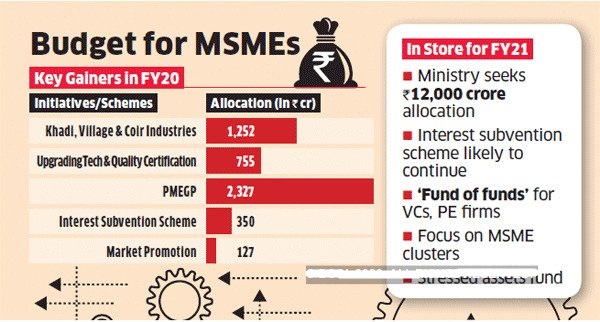India has 6.33 crore MSMEs employing more than 11 crore persons. MSMEs, contributing nearly close to half of the country’s total exports and almost onethird of India’s GDP, is the mainstay of our economy. Since the COVID-19 outbreak, the closing of international borders followed by the near-complete domestic lockdown, has led to MSMEs facing a sharp demand depression and a massive cash crunch. Almost all MSMEs have seen a fall in the number of orders and their inventory levels are rising. Exporters are staring at cancelled orders and payments worth crores are delayed. With the large-scale migration of workers from urban centres to rural areas, small businesses are dealing with even more uncertainty. The biggest challenge for MSMEs is paying wages. EPF and Miscellaneous Provisions Act, 1952 is presently applicable to establishments with 20 employees or more, whereas most micro-businesses that comprise 99 percent of all MSMEs have between 5-10 workers. This makes most small, informal economic units ineligible to have PF accounts for their workers. Therefore, the financial package announced by the Finance Minister will not cover a large majority of enterprises in India. In this time of unprecedented crisis, following measures should be taken by the government to immediately alleviate the sufferings of the MSME Sector: 1. Setup COVID-19 MSME Corpus allotted at least rupees one lakh crore, along with MSME control room and helpline; a. COVID-19 MSME Corpus fund of rupees one lakh crore to roll out distress relief measures immediately. b. 24×7 MSME Control room and helpline to provide cross-country logistics support addressing supply chain continuity. 2. Ensure liquidity for business continuity; a. The government must direct all its agencies and public sector units, to pay their bills immediately, similar to the initiative taken under NHAI. b. Require financial institutions to reschedule/restructure loans, as well as offer 6-month payment moratoriums to MSMEs. Extend soft loans with ~50% govt. guarantee for affected sectors through SIDBI, along with an ad-hoc enhanced working capital limit of 25% on request. c. Enterprises which have no finance facilities from public sector banks, should be offered ad-hoc working capital loans, up to a maximum of Rs. 30 lakh or an amount equal to average of 4 months of their last financial years turnover, whichever is lower, to be covered under the Ministry of MSME’s collateral coverage scheme. Priority must be given to women entrepreneurs and those from disadvantaged sections. d. Exporters who have already supplied but not been paid need to be supported immediately through advances from Export Credit Guarantee Council to be squared off once the money is received, or adjusted against the insurance. e. Enable MSMEs to discount their bills to approved retailers in 15 days and permit retailers to pay in 120 days through a Special Factoring Fund. 3. Prevent mass unemployment; a. Provide wage subsidy to employers including input tax credit for salary paid beyond 15 days to employees who cannot work from home. b. Give tax credit to companies for giving paid sick leave. Fourweeks of paid sick leave for MSME employees should be advocated. c. Self-employed including hawkers, small shopkeepers, those offering private services such as plumbers, electricians, drivers etc., who do not fall into the regular or casual salaried workers in other enterprises, must be provided direct cash transfers. d. Re-open industries where work from home is impossible, especially in manufacturing, construction, logistics and transport, as soon as possible, with all social distancing measures for employees. 4. Deferment of payment of dues and pause litigation; a. Introduce provision for extending the closing of Financial Year 2019-20 for all forms of MSME enterprises, Partnerships, Proprietorships, LLP, Private Limited or Limited. b. Provide option to defer tax payments by six months. Extend permission for delayed GST payments, without levy of interest, late fees or penalties, to all statutory payments. c. Advisory to waive all taxes to local bodies, fixed charges on electrical installations, property taxes for at least next three months. d. Provide extension of period for declaring NPAs by MSMEs, allowing roll over of terms loans and implementation of moratorium on EMIs for industrial loans and faster tax refunds. e. No punitive action to be taken by NCLT for delays of repayments etc. till 31st December 2020. 5. Improve consumer sentiment and investment appetite (postlockdown); a. Exemption of service tax from April 1, 2020 to August 31, 2020. b. Tax relief for domestic travel and tourism from May 1, 2020 to October 31st, 2020. c. Additional tax breaks and depreciation benefits for new investments in Q2/Q3 of 2020. d. Tax exemptions/ depreciation benefits to industries that are particularly badly hit for Q2/ Q3/ Q4 of 2020.
